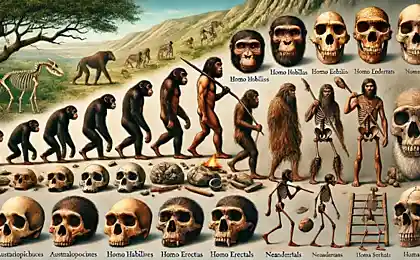674
Posthuman future: who will take the place of the obsolete Homo Sapiens

The human eye ©Getty Images From the dawn of reason man wanted to part with the burden of their biology and to expand the capacity of the body. Immortality, flight, unlimited intelligence – all attracted by the more ancient peoples, and now excite the scientific world. Technology has never been so close to a long – awaited leap-from human to creature, which far exceed ours. However, what the consequences will give rise to this transition? Will he not become the greatest catastrophe in the history of mankind, which in the process, will simply disappear as a species?
In the beginning was SmartWired whether there is a more influential factor in a person's life than the realization of their own mortality. People received it with the mind, and for that reason carry this burden all alone. The knowledge of death through permeates human nature and is the basis of the diversity of human culture. Disagreement of man with the naturalness of death and the desire for immortality reflected in the most ancient beliefs. At this depth, archetypical fear has played and continues to play very many religions, the promise of everlasting afterlife in a new, often attractive reality – from the dark underworld of Hades to the Paradise gardens and the blessed embrace of hundreds of black-eyed virgins.
In other faiths, in particular Hinduism and Buddhism also postulated the finiteness of the body, but the immortality of the soul. Carrot in the form of beautiful in its symbolism of the other world, however, is not here, but there is the concept of the transmigration of souls, according to which each person, depending on their life Affairs, moved after death into a new body, and this is ensured immortality.
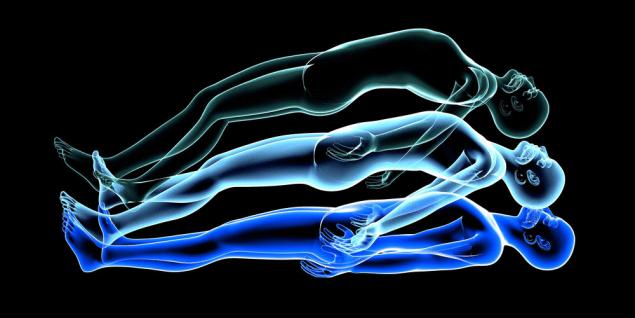
©depositphotos.com
It is noteworthy that science can theoretically realize the reality and he and the other scenario, however, we will not get ahead of ourselves.
Unbearable biologicznej being
In addition to mortality, burden of a man is his biological past, which he always carries with him. After all, is what the modern man is the result of hundreds of millions of years of evolution and layering of different genes.
And evolution is too "conservative", that is, relies on old and not always the best engineered solution. For this reason, for example, our eye is designed in an absurd way — with receptors which are brought to the brain, not to light. It happened because the human eye evolved from light sensitive spots of lancetnik, the receptors of which facing the inside its almost transparent body. Because of this nuance of light has to pass several layers of neurons before reaching the receptors inside-out and pass, finally, a visual signal to the brain.
The blindness of the evolutionary process due to the fact that it is adapted exclusively for short-term objectives and uses of solutions, which will lose effectiveness in the future and become malicious.
For example, such solution is ridiculously long recurrent laryngeal nerve in mammals, which is to link the larynx and the brain for the easiest path, descends to the heart, wraps around the aortic arch and back to the larynx. Because of this, aortic aneurysm, for example, can cause paralysis of the vocal cords. This decision we also inherited from those times, when our ancestors were fish – they are just missing the neck, and the solution which was effectively then started to affect through millions of years.
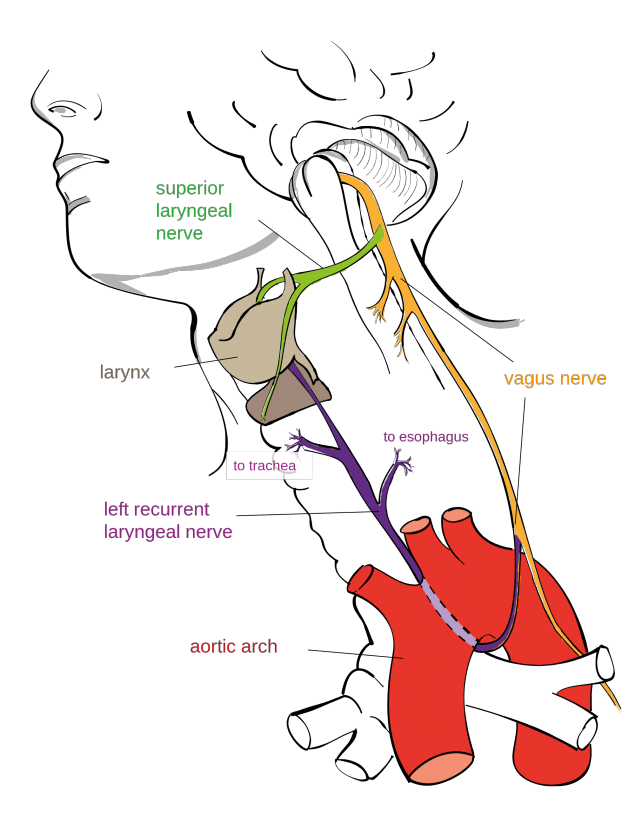
The left laryngeal nerve (highlighted in purple) / ©Wikimedia Commons
Evolution, of course, failed to predict that people will be upright, move to the city and fly into space. The body we have now is designed to solve highly specialized and obsolete task – to escape from predators in the jungle, or hunting. So, for example, a sedentary way of life, unnatural for our ancestors, it brings so much health problems.
All this, of course, and affects our psychology, which, judging by the many factors like the characteristics of sexual desire and social hierarchy in some countries, also imperfect and rather our animal past than the present human.
In all the soils from the fear of death and frustration from the limitations of his own body and the irrelevance of its devices for the tasks of modern civilization – was born the desire to make man something more than he was as a result of natural evolution.
Something that could be called superhuman or Posthuman.
Longing for the Superman Most clearly scientific-philosophical idea that man is only an intermediate link on the path from animal to Overman, developed in his works in the late nineteenth century German philosopher Friedrich Nietzsche.
For example, in his work "thus spoke Zarathustra" he writes: "Man is something that shall surpass... What is a monkey against a man? A mockery or a painful shame. And the same man should be to the Superman: a laughing stock or a painful shame."
Without downplaying the importance of man, Nietzsche posits the whole world, according to which all human effort should be directed at preparing the world and the man himself for the arrival devoid of the shackles of morality and a genuinely free Superman. "Man", he writes, should be "longing and arrow for Superman."
Nietzsche, however, did not mention in this context of technology. He believed that man must evolve into a perfect form itself, using self-development.
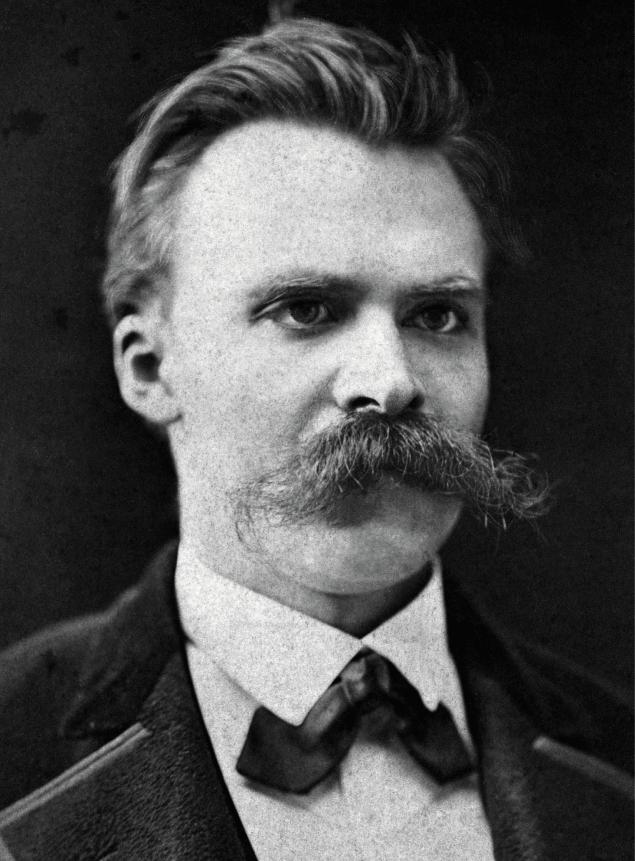
Friedrich Nietzsche / ©Wikimedia Commons
This, however, did not prevent the "superhuman" aspect of Nietzscheanism to turn into the twentieth century in a new technocratic form – transhumanism. Transhumanists usually repudiate ties with Nietzscheanism, but the influence of the philosopher, if the reading of the manifestos of the transhumanist movement, it becomes more than obvious.
Humanity+ Transhumanism is currently the largest and most developed international movement, directly aimed at achieving a Posthuman future. It transhumanist scientists, philosophers and futurists managed to introduce the concept of "Posthuman" and popularize it.
Having started in the late 1920-ies, transhumanism has developed several internal flows, but the ideological Foundation laid by the founders of this movement, remained intact: all the development of technology in order to use them to turn a man into a more perfect being of the Posthuman.
People who share transhumanist views and strive to bring Posthuman future, transhumanists call translucida, emphasizing the transitional nature of contemporary human nature.
Transhumanism is true of so many fields of science: Cybernetics, nanotechnology, bioengineering, genetics, and others. Among the objectives of not only achieving immortality, but also a significant increase of physical and intellectual abilities, improvement of sensory organs (or even adding new ones).
Among the most popular modern transhumanists, the movement of which is currently covered almost all technologically developed countries (including Russia), it is possible to allocate a well-known futurist and inventor Raymond Kurzweil.
He was able to develop and justify the concept of a technological singularity – the point where technological progress becomes so rapid that its further development is simply impossible to predict. According to Kurzweil, a technological singularity could occur in 2045 because of the emergence of a powerful artificial intelligence and cyborgization active people, i.e. replacement of human body parts with artificial, but more efficient counterparts.

Raymond Kurzweil / ©Getty Images
Central to Kurzweil's predictions, who now heads a NASA and Google-funded singularity University in California, belongs to nanotechnology. In his opinion, due to the evolution of nanotechnology will occur the rapid development of medicine and industry (in 2020-ies) that gradually not only will make a person immortal, but will significantly reduce the cost of production of various products is actually deciding once and for all the problem of food security.
At the moment the world Association of transhumanists called Humanity+. This name change probably occurred in order to rebrand the movement under pressure of critics, accusing transhumanists in the pursuit of too radical a change in the person. Now transhumanists are concentrated on the ethical use of science and technology to improve the human body.
Faces of the Posthuman Transition from human to Posthuman can occur in several forms. Each of them, one way or another, will inevitably lead to some social conflicts that can range from temporary discomfort at the appearance of a new species of human to all-out war that will devastate the planet.
For this reason, this theme is terrific dramatic material, which has repeatedly been used in science fiction. Some writers were able to develop the theme and conflicts of the post-human future is quite an original way. Not all of these scenarios materialize, but each of them to a certain extent possible. Let's look at what are the key themes dominant in this context in various art worlds.
The "classic" postlude can be found, for example, in the novels by American writer Dan Simmons "Hyperion" and "Ilion". In the first case, a race of Vagabonds – the former Homo Sapiens by genetic engineering evolved for space travel (as the human body, as already known, inefficient and highly vulnerable in conditions of weightlessness and prolonged exposure to cosmic radiation).
In "Ilios" (and the sequel, "Olympus") subject postlude reveals more detail. On one hand, it pumped nanotechnology group postlude settled on the Martian Olympus. In the plot it becomes clear that they have forgotten their human past and believe that you are indeed the Olympic gods (from Zeus to Hephaestus), and then started a Grand multi-year performance based on divine intervention in the siege legendary of Troy in an alternate universe, which periodically visited with the help of teleportation.
On the other hand is a group of the first postlude dwelled in the Earth's orbit (to avoid conflicts with ordinary people left on the planet) and selecting the appearance of exclusively female bodies with perfect and ageless physiology.
Another classic view of the Posthuman is an artificial body, an avatar, in which you can "move" the human mind (as in digital form, and using transplants organic brain), reaching, thus, immortality through the incarnation of the ancient concept of the transmigration of souls.
The concept of the body-the avatar varies widely – from a vessel in the face of an alien organism (for example, the movie "Avatar") to a fully identical copies of your body, in which resettlement is carried out after the death of the previous shell (the TV series "Battlestar Galactica"). Sometimes the body-an avatar is used only temporarily by connecting to it through the interface brain-computer (for example, the film "Surrogates").
It should be noted that this plane – the creation of a body-an avatar – is working at the moment Russian project "Russia 2045".
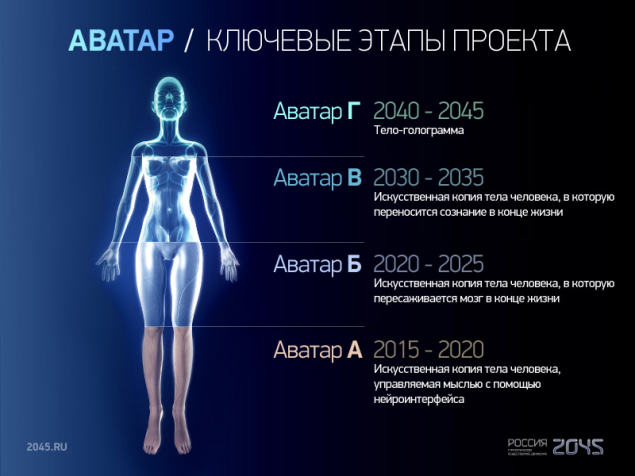
The stages of the project "Avatar", stated the Russian strategic movement "Russia 2045" / ©2045.ru
The next version of the Posthuman found in science fiction, the topic of digital immortality. For example, in the novel "False blindness" by American writer Peter watts describes not that distant future in which humanity is on the verge of relocation in a digital reality – in fact, in a computer, which digitized minds can almost always exist in the individual virtual Paradise. Around about the same wrote Philip dick's novel "Ubik". Given the current pace of development of virtual reality technology, this perspective appears to be the least fantastic.
There are the concept of the Posthuman, which does not affect the subject technology. For example, in "the Ugly swans" Strugatsky brothers, we are introduced to the "biting midges" that teach human children to reveal their huge, latent potential previously unavailable to adults. Children then, only through self-development, become a kind of superhuman, a vastly superior intellectually and morally to their parents, which leads to the dramatic conflict.
Of course, it's not possible concept of the Posthuman of the future described in science fiction and futurology. At desire it is possible to find a dozen original concepts, but we picked up, in our view, the most interesting of them.
People against the Posthuman is Not all, however, share the enthusiasm of transhumanists and futurists. Posthuman future – whatever it is – surely approaching technology. However, when migrating the concepts to the real socio-political conditions detected by a number of insoluble, sometimes catastrophic in its potential pitfalls.
The most consistent and influential critic of transhumanism can be called a well-known American political scientist Francis Fukuyama. Having examined in detail the possible consequences of an ideological victory of transhumanists over the governments of the world, Fukuyama comes to a number of conclusions that call into question not only the transhumanist values, but also the motion vector of modern science as such.
In particular, in his book "Our Posthuman future", he notes that "science alone is not able to set those goals and limits, to achieve which it is intended" (about the dangers of uncontrolled technological progress, and wrote Stanislaw LEM in his book "Sum of technologies").
In that book, Fukuyama (briefly with the thesis of the political scientist, see his article published in 2004 in the journal of Foreign Policy) makes a number of logical arguments backed by reasoning on why transhumanism may be dangerous for mankind.
Among them we can highlight two main points. First, people spent a long time developing in an evolutionary way and contains a lot of both positive and negative traits – but it is this complex combination makes us human and allows us to evolve as a species. Radical intervention in this process through technology may not elevate man, but rather, to dehumanize him, the analyst believes.
Secondly- and this problem is most obvious – the appearance of the first postlude will automatically divide people on an unprecedented earlier principle and will create enormous potential for conflict in the social, economic and political spheres. In other words, it will cause unpredictable extent of inequality and confusion in the field of law (what rights you have, and what is the Posthuman? Is the Posthuman person, and so on).
The consequences of this artificially created inequality will be unprecedented, because previously, despite all the differences, people were United by one important fact – they were a single species, Homo Sapiens. Now the mankind will be divided into two (or even more). It is not excluded that on financial grounds, because the technology "posthumanists" can be too expensive for ordinary people.
In fact, it will destroy the entire system of liberal democracy that exists at the moment in Western countries and is based upon a philosophical Foundation, for example, on the concept of natural rights (all people are born equal and born with certain rights), which just loses all meaning with the advent of the first Posthuman. How can you postulate such ideas if people will be divided into several types and will not share a common human nature?
In the days when people just got out of reigned for almost his entire previous history of inequality, it risks being even more unjust world than ever before – all thanks to biotechnology and transhumanism, no matter how good their intentions may be, Fukuyama believes.
The Russian transhumanist movement, for example, responds to similar criticism: "such allegations are based either on an incomplete vision of the future, or on an arbitrary preference of the author. As a rule, is not taken into account the General tendency to the depreciation of various services, including medical, robotics and the obtaining of surplus value by robotics, the possibility of redistribution of that income to state agencies in favor of the population, is not considered the development of nanotechnology and, especially, predicted the emergence of nanofabric and nanoassemblers. Also not being considered intellectual upgrade of each person".
In the rhetoric of the supporters of transhumanism we can also find such arguments as the presence of a technological component in the modification of a person's life for the past several centuries is, for example, medicine, cures for diseases, antibiotics, which have long stepped in and dramatically changed the natural course of human evolution (now survive even initially weak and sick, which completely negates natural selection).
The greatest achievements of science and technology, transhumanists believe, has always been perceived by society as a perversion and an insult to nature, before settling in the masses. Therefore, it is possible to notice such a strong rejection of technological intervention into the human body (especially in a religious environment), which, on the other hand, with all sorts of implants and transplanted (or even artificial) bodies going on for quite some time.
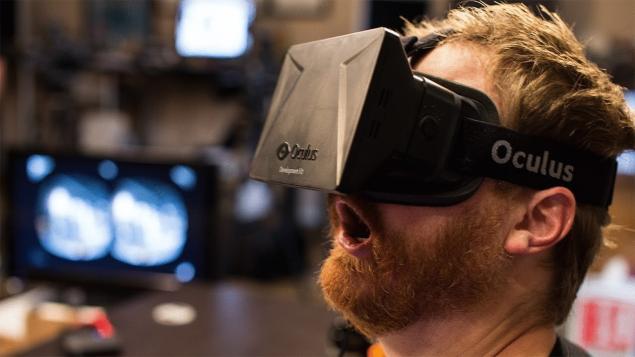
Virtual reality glasses Oculus Rift / ©Tested
Who is right, apparently, only time will tell, which inevitably brings Posthuman reality in several potential forms. The power of computers is growing in this industry is expected to "quantum revolution", nanotechnologies are going forward by leaps and bounds, and in the coming years we will probably be able to see high-precision drug delivery to a target cell using nanodevices; methods of prolonging life have more and more success on mice, and technologies like Oculus Rift allow you to plunge into the virtual world deeper than ever before.
It is unlikely that all these processes can be slowed down, not to mention stop. It remains only to enjoy the benefits of technological progress and monitor developments.
Source:Naked Science
Source: /users/1077



